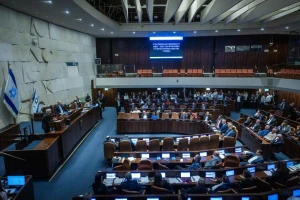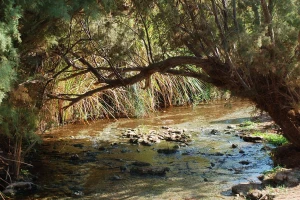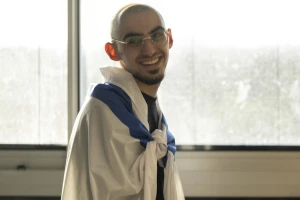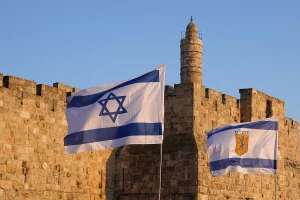Protesters, opposition leaders in Tel Aviv demand accountability for Oct 7 atrocities
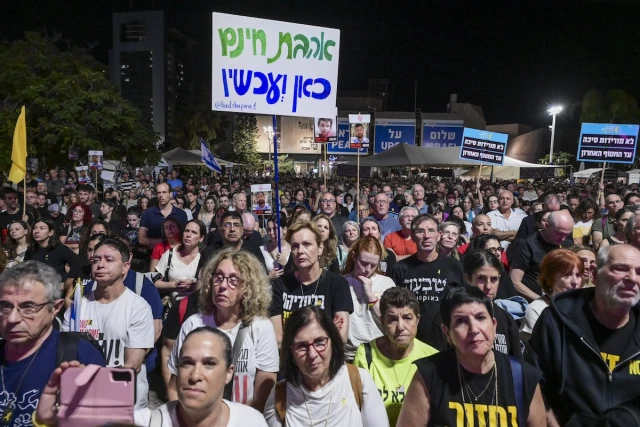
Protesters have been gathering weekly in major cities across Israel since the Hamas-led massacre of 1,200 Israelis and the kidnapping of 251 people into Gaza on Oct. 7, 2023. While they continue to demand the release of the three remaining hostages still held in Gaza, they are also calling for an independent investigation into how the attack was able to occur.
On Saturday night, five opposition leaders joined demonstrators at Habima Square in Tel Aviv to press for a state commission of inquiry into the Oct. 7 events. Their protest took place alongside the weekly rally in nearby Hostages Square, which featured speeches by two former hostages and family members of the others still being held in Gaza.
At Habima Square, organizers aimed to rally Zionist opposition parties around the push for a judiciary-led state commission, coming less than a week after Prime Minister Benjamin Netanyahu’s government approved the creation of its own self-appointed inquiry.
Opposition Leader Yair Lapid, along with MKs Benny Gantz, Gadi Eisenkot and Yair Golan, took part in the protest. These three leaders are prominent figures heading centrist or left-wing factions critical of Netanyahu.
The Times of Israel reported that Izhar Shay, a former MK and minister whose son Yaron died resisting the Oct. 7 assault, called on opposition leaders to press for a state commission following next year’s election.
“I call on the leaders of the opposition parties to officially commit not to join after the election any government that does not promise in its basic guidelines to establish a state commission of inquiry immediately upon taking office,” said Shay, who held ministerial and Knesset roles as part of Gantz’ Blue and White party.
The Times reported that he went on to call for investigators and witnesses to refuse participation in the government-led inquiry, which he labeled a “whitewashing” committee. Opponents say the same government that held office on Oct. 7 cannot credibly lead an investigation into the events of that day.
“Don’t appear before a committee that has a mark of shame hanging over it and the blood of the fallen and murdered smeared on the hands of its creators,” Shay said.
Protesters carried large banners that read, “Wanted: a strong, united opposition.”
While marching, they also chanted, “It’s time to topple the tyrant,” referring to PM Netanyahu.
A large screen set up along the eastern edge of the square carried the speeches and simultaneously projected the names and photographs of some of Oct. 7 victims, alongside questions about the circumstances in which they were killed.
As MC Rafi Ben Shitrit – a bereaved father and former Beit Shean mayor from the October Council – announced their names, the crowd cheered for each opposition leader present. Gantz, who joined Netanyahu’s government following the Oct. 7 attack, was met with both applause and scattered boos.
The gathering also included representatives from the anti-corruption watchdog Movement for Quality Government, groups of anti-government reservists and veterans, and activists who lined the western side of the square in silent protest, holding candles and displaying placards with the names and photos of Palestinian children killed in the Gaza war.
Adi Zakuto, whose father Avi was murdered in the southern city of Ofakim during the onslaught, said what “burns me today, more than the pain, is the thing my dad hated more than anything – evading accountability.”
She criticized the ministerial panel formed this week to define the scope of the government inquiry, calling it “a political commission of the investigated trying to decide who will investigate them.”
In criticizing the government’s desire to control the narrative, Zakuto said, “Whoever was part of the failures can’t write the rulebook of the investigation. Whoever took Israel back to the age when citizens were prey cannot determine what can be asked and what can’t be probed.”
“In the name of my father, in the name of everyone who is no longer here, the kidnapped, rescued, wounded… don’t let them get away,” she challenged.
“Truth will out; I won’t let anyone bury it,” Zakuto promised.
Tali Biner, a survivor of the Oct. 7 massacre at the Nova music festival, emphasized what she described as the nonpartisan nature of the call for a state commission of inquiry – an initiative Netanyahu opposes because it is led by the judiciary, which his government has sought to weaken.
Speaking directly to the government, Biner said: “We are not the enemy, and this is not politics.”
“Whoever tries to portray this as political is a person who despises truth,” she added. “We are the citizens whose security you were responsible for.”
Bar Godard, daughter of the late hostage Meny Godard, whose body was returned from Hamas captivity last week under the Gaza ceasefire, urged the hundreds assembled at Tel Aviv’s Hostages Square to continue pressuring the government to secure the return of the remains of the three deceased hostages – Master Sgt. Ran Gvili, Dror Or, and Sudthisak Rinthalak – who are still in Gaza.
“The return of the deceased is not a favor to the families. It’s the most basic duty the State of Israel has to its citizens… A duty our leadership has forgotten again and again…” Godard said.
Many who perished on Oct. 7 were killed earlier in the day and their bodies were abducted by other terrorists who roamed around the various kibbutzim collecting the deceased victims to use for collateral. Godard’s father was one of those bodies taken into Gaza. She pointed out that the terrorists did this “because they knew the citizens of Israel don’t give up on their dead. They knew our mutual accountability is deeper than our leaders’ cynicism.”
At the rally, Or’s brother Elad called on the government to “honor our basic, moral and civil right, after our security was violated and trampled again and again in these long years of abandonment,” and to bring home the bodies of the three remaining deceased hostages.
“There will be no Israeli rehabilitation without Sudthisak, Dror, and Ran at home,” he said. “We’re tired and we’ve been through so much – but we believe. The fragile ceasefire must not break down.” Many Israelis have echoed Elad's sentiments in declaring how they simply need a grave to visit if they aren't able to hug their loved ones.
The Times of Israel reported that the other speakers at the event included Sylvia Cunio, mother of released hostages David and Ariel Cunio; Gania Erlich Zohar, aunt of the slain hostage Cpt. Omer Neutra, whose body was returned earlier this month; released hostages Raz and Ohad Ben Ami; and Ziv Tsioni, the uncle of Gvili.
“Just days before the last [ceasefire] deal, Raz and I met with [US] President [Donald] Trump, the most powerful man in the world, to ask him to save the hostages and return the deceased,” said Ohad Ben Ami, who was freed during a ceasefire in February. “From here, I urge him to ensure that the work he led is completed fully. His life’s mission is our lives.”

The All Israel News Staff is a team of journalists in Israel.
You might also like to read this:


